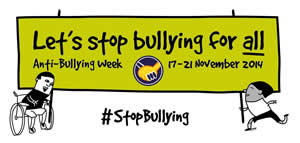 Whether you have blond, brown or ginger hair or whether you are small or tall or maybe you’re into pop music or you’re a ‘Goth’. You may play football or prefer to play a guitar.
Whether you have blond, brown or ginger hair or whether you are small or tall or maybe you’re into pop music or you’re a ‘Goth’. You may play football or prefer to play a guitar.
These aspects make us what we are, our characters, our personalities as individuals, each and every one of us are unique in some way. We may have things in common to others, but when you really compare each human being to the next there are far more differences than similarities.
17th - 21st November it is national ‘Anti-Bullying Week’ and so to assist teachers delivering lessons, here are a few ideas and resources that can be employed in order to engage students in this important subject area.
Bullying Classroom Discussions
We are all different, but what does that actually mean?
As a class discussion explore what the students believe is the meaning of that phrase and why differences such as those listed below may trigger bullying:
•Race, gender
•Hair colour, hair style
•Clothes we wear
•The things that interest us (Music, sport, drama, reading etc.)
•Where we live and who we live with.
Would we change?
Teachers could ask the students what they would do if they began to dislike their present hair style, the clothes that they were wearing or the music they were listening to, drawing from them the idea that these are things that they can choose to change, they are under their control. How do they think these changes would affect the behaviour of those around them?
What can't we change?
Teachers could then steer the discussion onto aspects that we can’t change about ourselves such as our skin colour, for example, the country where we were born, our sexuality, or disabiliities. These can often be triggers for bullies, but they are things that can't be changed. Why do bullies target these areas?
Dealing with bullies
How should students react if they are being bullied, they see someone being bullied or if they believe someone is being bullied? Should they walk away? Should they tell an adult? Should they step in and say something? Who should they tell? This could be a small group exercise with each group contributing their ideas to a class discussion.
Students could also be asked how they believe they should treat people and whether they should treat those with different skin colours, sexualities or disabilities etc. differently? Why is this important?
Cyber Bullying Competition
 Internet Matters is helping to raise awareness of the important issues of online respect and cyberbullying by launching an exciting competition with the Anti-Bullying Alliance. The competition asks schools to create their own song, rap or poem on the subject of being respectful to others online to generate important discussions of this issue amongst students, teachers and parents, both inside and outside the classroom. The winners will be chosen by a panel of judges including singer and Internet Matters ambassador, Sophie Ellis-Bextor. The winning Secondary school group will enjoy a special daytrip to Sky’s TV studios in West London where they’ll make their own film.
Internet Matters is helping to raise awareness of the important issues of online respect and cyberbullying by launching an exciting competition with the Anti-Bullying Alliance. The competition asks schools to create their own song, rap or poem on the subject of being respectful to others online to generate important discussions of this issue amongst students, teachers and parents, both inside and outside the classroom. The winners will be chosen by a panel of judges including singer and Internet Matters ambassador, Sophie Ellis-Bextor. The winning Secondary school group will enjoy a special daytrip to Sky’s TV studios in West London where they’ll make their own film.
The competition is open until 28th November 2014 with a lesson plan and full details about how to enter on the Internet Matters website. Start getting creative!
Anti-bullying Assembly
At Teaching Resources Support (TRS), you can download an Anti-Bullying assembly plan which aims to encourage students to think about the consequences of bullying, helps them understand how to tackle bullying behaviour and provides guidance for those who witness others being bullied. This is available to all TRS members, simply login or join free and download the teacher script and PowerPoint presentation from your dashboard.

 The week from 3rd – 7th March sees the seventh annual National Apprenticeship Week taking place, which celebrates how apprenticeships can change the lives of young people positively, particularly those that may not be academically orientated and, at the same time, benefit businesses and the economy.
The week from 3rd – 7th March sees the seventh annual National Apprenticeship Week taking place, which celebrates how apprenticeships can change the lives of young people positively, particularly those that may not be academically orientated and, at the same time, benefit businesses and the economy. In the week between 3rd and 9th March, Britain’s biggest climate change campaign takes place, which hopes to ‘inspire a new wave of action to create a sustainable future’. Every year, 3000 events organised by schools, businesses, charities and councils are attended by up to half a million people hoping push the issue of climate change to the forefront of our minds. The organisers of ‘Climate Week’ want different groups and organisations to start planning events, no matter how small, in order to support the campaign.
In the week between 3rd and 9th March, Britain’s biggest climate change campaign takes place, which hopes to ‘inspire a new wave of action to create a sustainable future’. Every year, 3000 events organised by schools, businesses, charities and councils are attended by up to half a million people hoping push the issue of climate change to the forefront of our minds. The organisers of ‘Climate Week’ want different groups and organisations to start planning events, no matter how small, in order to support the campaign.